大学进行时
大学英语知识点总结归纳

大学英语知识点总结归纳一、语法知识点1. 英语句子的基本构成英语句子的基本构成包括主语、谓语、宾语等,根据不同的语法成分可以分为简单句、并列句、复合句等多种形式。
掌握句子的基本构成对于语言的准确表达和理解至关重要。
2. 时态英语中的时态包括一般现在时、一般过去时、一般将来时、现在进行时、过去进行时、现在完成时、过去完成时等。
时态的正确使用可以使语言表达准确清晰。
3. 语态英语中的语态包括主动语态和被动语态,正确使用语态可以使表达更加灵活多样。
4. 语气英语中的语气包括陈述语气、疑问语气、祈使语气等,每种语气的使用都有其特定的情境和表达方式。
5. 并列连词和从属连词并列连词用于连接并列结构的词、短语、从句等,包括and、or、but等;从属连词用于连接主从复合句,包括because、when、although等。
6. 形容词和副词的比较级和最高级形容词和副词的比较级和最高级形式可以用于比较不同事物的程度和大小。
7. 定冠词和不定冠词定冠词包括the,不定冠词包括a和an,使用时需要根据名词的情境和特点正确选择。
8. 代词代词分为人称代词、物主代词、反身代词、指示代词等,根据情境需要选择正确的代词形式。
9. 主谓一致主谓一致是指主语和谓语在人称和数上保持一致,是英语句子中的重要语法规则。
10. 介词介词用于连接名词、代词、动词或形容词等,构成介词短语用于修饰其他成分,掌握介词的使用可以使语言表达更加丰富。
二、词汇知识点1. 单词的拼写和发音掌握英语单词的拼写和发音是学习英语的基本功,有助于提高语言表达的准确性。
2. 同义词和反义词同义词和反义词可以丰富语言表达的方式,帮助学习者避免重复使用相同的词汇。
3. 词汇搭配词汇搭配是指在语言表达中,词语之间常常有固定的搭配关系,如动词搭配介词、名词搭配形容词等,掌握词汇搭配可以使表达更加自然流畅。
4. 词义辨析英语中存在大量近义词和异义词,学习者需要掌握它们的区别和正确用法,避免混淆。
我的大学剪辑

入学篇
• 2011年9月30日,伴随着蒙蒙细雨,全国各地 我们聚集到了中国矿业大学这个大家庭里, 开始了我们的梦想之程……
军训篇
• 矿大的军训,实在是折磨人……但是当将 近20天的军训真正要结束时,20天的酸甜 苦乐成为了我们美好的记忆……
学习篇
的方每大 还法个学 是,人生 学但有活 习是自是 唯己美 一的好 不生的 变活, …… •
友多在 新社 同团 学, ,锻 拥炼 有了 了自 很己 多。 新结 朋识 了 好 ……
•
社 团 篇
忆 美好 生 好多 活 回 中
生活篇
大学进行时……
来的大 书人学 写生在 !等继 待续 着, 我我
•
•
大学英语教材重点知识归纳

大学英语教材重点知识归纳大学英语是大学本科阶段必修的一门课程,为培养学生的英语语言能力和跨文化交际能力提供了重要支持。
在大学英语教材中,有一些重点知识点对于学生的学习和应用至关重要。
本文将对大学英语教材中的重点知识进行归纳总结,以便学生更好地复习和掌握。
一、语法知识1. 时态和语态大学英语教材中常涉及到各种时态和语态的使用,在句子中起到不同的作用。
包括一般现在时、一般过去时、现在进行时、过去进行时、过去完成时等。
同时,被动语态也是学生需要掌握的重要语法知识。
2. 从句从句是大学英语教材中常见的句型结构,包括定语从句、宾语从句和状语从句等。
学生需要理解从句的引导词和从句与主句之间的逻辑关系,正确运用从句来更好地表达自己的观点和意图。
3. 句子结构在大学英语教材中,常出现复杂的句子结构,如并列句、复合句等。
学生需要学会使用适当的连词和标点符号,使句子结构清晰,逻辑性强。
二、词汇知识1. 同义词与反义词大学英语教材中常包含大量的同义词和反义词,学生需要学会辨析它们的词义和用法,以便更好地理解文章的意思。
2. 词根和词缀学生需要学会词根和词缀的基本含义和用法,通过拆解词根和词缀来理解和记忆词汇,提高自己的词汇量和词汇应用能力。
三、阅读理解1. 阅读技巧大学英语教材中的阅读材料常涉及到各种文章类型,学生需要学会使用有效的阅读技巧,如快速阅读、略读和精读,以便更好地理解文章的主旨和细节。
2. 阅读策略阅读理解过程中,学生需要掌握一些阅读策略,如预测、推理和归纳等,以帮助他们更好地理解文章的意义和结构。
四、口语和写作1. 口语表达大学英语教材中的口语练习常涉及到日常对话、演讲和辩论等。
学生需要学会流利地表达自己的观点,使用正确的语音语调和灵活运用词汇。
2. 写作技巧写作是大学英语教材中的重要部分,学生需要学会合理组织文章结构,使用恰当的词汇和句型,有效地表达自己的思想和观点。
通过对大学英语教材中的重点知识进行归纳总结,学生可以更有针对性地进行学习和复习。
2021年6月大学英语四级语法知识:将来进行时

在大学英语四级考试中,单独考察英语四级语法的题几乎没有,但是英语四级语法知识点却贯穿整张试卷,下面是为大家整理的大学英语四级语法知识,希望可以为大家带来帮助,一起来学习一下吧。
2021年6月大学英语四级考试语法目录
11.21 将来进行时
1) 概念:表示将来某时进行的状态或动作,或按预测将来会发生的事情。
She'll be coming soon.
I'll be meeting him sometime in the future.
注意:将来进行时不用于表示"意志",不能说I'll be having a talk with her.
2)常用的时间状语
Soon, tomorrow, this evening,on Sunday, by this time,tomorrow, in two days, tomorrow evening
1。
大学生如何进行时问管理
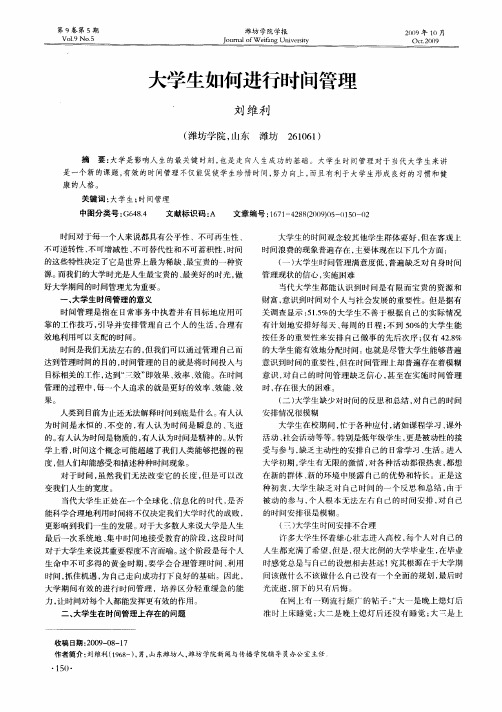
度, 但人们却能感受 和描述种种 时间现象。
对 于时间 , 虽然我们无 法改变它的长度 , 但是可 以改
变 我们 人 生 的 宽度 。
大学初期 , 学生有无限的激情 , 对各种 活动都很热衷 , 都想
在 新 的群 体 、 的 环境 中展 露 自己 的优 势 和 特 长 。 正 是 这 新 种 初 衷 , 学 生 缺 乏 对 自己 时 间 的 一 个 反思 和 总 结 , 于 大 南 被 动 的参 与 , 人 根 本无 法 左 右 自己 的 时 间 安 排 , 自 己 个 对
时间管理是指在 日常事务中执着并有 目标地 应用可 靠 的工作技巧 , 引导并安排管理 自己个 人的生活 , 合理有
效 地 利用 可 以支 配 的时 间 。
时间是我们无法左 右的, 但我们 可以通过管理 自己而 达到管理 时间的 目的 , 时间管理的 目的就是将时间投入与 目标相关的_作 , T 达到“ t ” _效 即效果 、 效率 、 效能 。在时间 管理的过程中, 每一个人追求的就是更好 的效率 、 能 、 效 效
安排 情 况 很模 糊
人类 到 目前 为 止还 无 法 解 释 时间 到 底是 什 么 。 人 认 有 为 时 间 是 永 恒 的 、 变 的 , 人 认 为 时 间 是 瞬 息 的 、 逝 不 有 飞 的 。 人认 为 时 间是 物 质 的 , 人认 为 时 间 是精 神 的 。 有 有 从
( ) 大学 生时 间 安 排不 合 理 许 多 大 学 生 怀 着雄 心 壮 志 进 入高 校 , 个 人对 自己 的 每 人生 都 充 满 了希 望 , 是 . 大 比例 的 大 学 毕 业 生 , 毕 业 但 很 在
对于大学生来说其重要程度不言而喻。 这个阶段是每个人
我作为大学生的感想
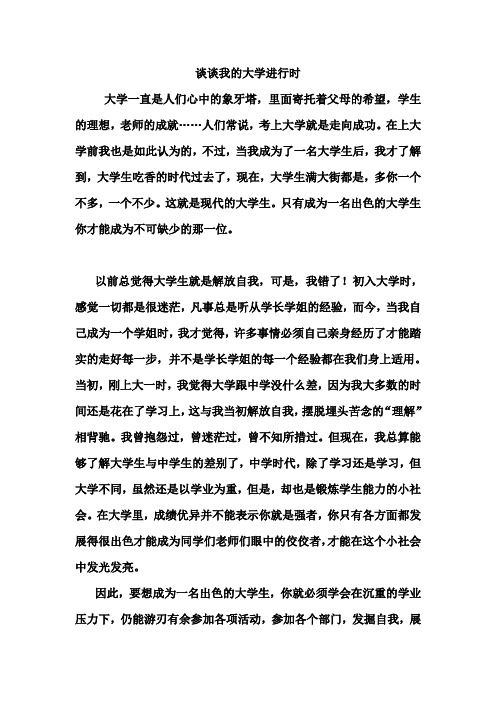
谈谈我的大学进行时
大学一直是人们心中的象牙塔,里面寄托着父母的希望,学生的理想,老师的成就……人们常说,考上大学就是走向成功。
在上大学前我也是如此认为的,不过,当我成为了一名大学生后,我才了解到,大学生吃香的时代过去了,现在,大学生满大街都是,多你一个不多,一个不少。
这就是现代的大学生。
只有成为一名出色的大学生你才能成为不可缺少的那一位。
以前总觉得大学生就是解放自我,可是,我错了!初入大学时,感觉一切都是很迷茫,凡事总是听从学长学姐的经验,而今,当我自己成为一个学姐时,我才觉得,许多事情必须自己亲身经历了才能踏实的走好每一步,并不是学长学姐的每一个经验都在我们身上适用。
当初,刚上大一时,我觉得大学跟中学没什么差,因为我大多数的时间还是花在了学习上,这与我当初解放自我,摆脱埋头苦念的“理解”相背驰。
我曾抱怨过,曾迷茫过,曾不知所措过。
但现在,我总算能够了解大学生与中学生的差别了,中学时代,除了学习还是学习,但大学不同,虽然还是以学业为重,但是,却也是锻炼学生能力的小社会。
在大学里,成绩优异并不能表示你就是强者,你只有各方面都发展得很出色才能成为同学们老师们眼中的佼佼者,才能在这个小社会中发光发亮。
因此,要想成为一名出色的大学生,你就必须学会在沉重的学业压力下,仍能游刃有余参加各项活动,参加各个部门,发掘自我,展
现自我,只有你真正的投入到大学生活里,积极参加活动,去寻找自己的位置,不断的磨练自己,你才能体会到大学的意义所在,才能在这个小社会中创造属于自己的光环。
比较好的校友回忆录的题目回忆大学生活题目
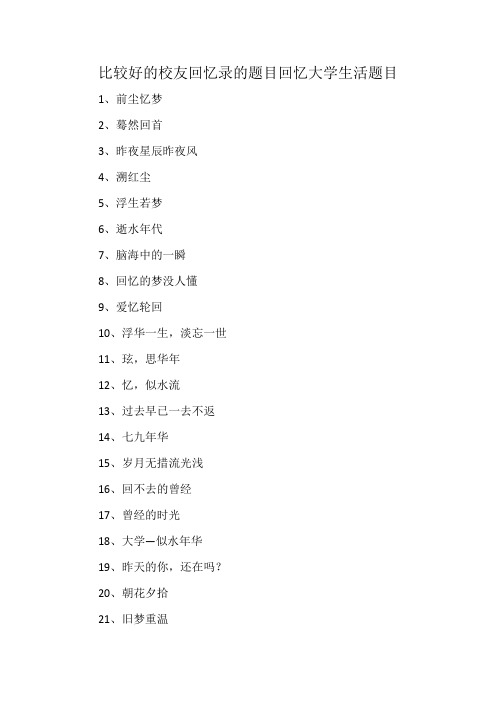
比较好的校友回忆录的题目回忆大学生活题目
1、前尘忆梦
2、蓦然回首
3、昨夜星辰昨夜风
4、溯红尘
5、浮生若梦
6、逝水年代
7、脑海中的一瞬
8、回忆的梦没人懂
9、爱忆轮回
10、浮华一生,淡忘一世
11、玹,思华年
12、忆,似水流
13、过去早已一去不返
14、七九年华
15、岁月无措流光浅
16、回不去的曾经
17、曾经的时光
18、大学—似水年华
19、昨天的你,还在吗?
20、朝花夕拾
21、旧梦重温
22、昨日
23、浮生若梦
24、珍藏
25、梦开始的地方
26、梦的起点
27、我心中的大学生活
28、消逝的梦
29、你好!人生的起点
30、那段大学岁月
31、不负华年,南下岁月
32、生活因大学而精彩
33、消逝的大学
34、微笑着,去唱大学的歌谣
35、与大学不止遇见
36、大学的葬礼
37、迷失的大学
38、下了定义大学
39、大学的独白
40、孤独的大学
41、大学,如此颓唐
42、大学狂想曲
43、大学,曾是个瞬间
44、大学飞鸟
45、大学力量
46、大学的童话
47、只属于自己的大学旁白
48、大学纪念册
49、大学剪影
50、穿梭在花季般时光
51、大学印记
52、大学进行时
53、放飞梦想起飞
54、大学舞台。
“大学区”是进行时

蔽 墩 s H N
Y u
间 交流 和提 高 的 途径 之 一 但 这种 交流 无 法 进 行 量 化
有发展 潜力、 不 断 提 高教 育 水 平 和 质 量 的 外 部 务件 要 实现 优 质 教 育 均 衡 发 展 ,还 得 靠 各 个 学 校 的 自身努 力 ,
积 极 调 整 思路 , 发 掘 内部 潜 力 , 激 发 教 师 的 工 作 热 情 和
么 立竿 见 影 吗 ?
在 采访 中 . 许 多有 识 之 士 指 出 . 真 正 意 义 上 实 现 教
育 优 质 资 源 均 衡 发 展 必 须 依 靠 内在 的 能量 聚 集 . 逐 步 形
成 优 质教 育动 态 生成 机 制 。 “ 外援只是输血 , 只有 转 化 为
内发 , 才能 真 正 达 成 义 务 教 育 内 涵 均衡 发 展 的 目的 。 ”
力量 的 提 高 。 ” 一 位 校 长 面 对记 者 的采 访 时 说 。 他 从 管 理 者 的 角度 认 为 :各 学 区方 案制 订起 来 比 较 容 易 . 但 是要将方案 落到实处. 需要 大 家 尤其 是 领 导 有 持 之 以
巨的毅力 , 否则 , 将会 虎头蛇尾 , 到 最后 流 于形 式 , 起 不到 真 正 的 作 用 教 学 资 源如 何 均衡 . 一 位 教 师在 面 对 记 者 的 采 访
大 .优 质 学 校 的 教 师 看 到 落 后 学 校 教 师 的 工作 环境 、
待 遇 等 会 更 加 珍 惜 自己的 工 作 岗位 . 而 落 后 学校 的教 师 能 从 优 秀 学 校 教 师 的 身 上 学 习到 先 进 的授 课 理 念
和 人 文 素 养 。这 种 交 流 和 学 习 可 以推 动 整 个 学 区师 资
动词16种时态形式一览表

动词16种时态形式一览表动词是表示动作、行为、状态或存在的词语。
它们根据具体时间的不同变化形成不同的时态。
一共有16种时态,分为现在时态、过去时态和将来时态。
现在时态有4种形式:一般现在时、现在进行时、现在完成时和现在完成进行时。
一般现在时表示经常发生的动作、行为或客观事实,通常与副词always、often、usually等连用,也可与时间状语连用。
例如:I play basketball every Sunday.(我每个星期天打篮球。
)现在进行时表示正在进行的动作或当前的状态,由be动词和动词的现在分词构成。
例如:She is studying for the exam.(她正在为考试复习。
)现在完成时表示过去发生的动作对现在造成的影响或结果,由have/has + 过去分词构成。
例如:We have visited the museum.(我们参观过博物馆。
)现在完成进行时表示过去一段时间内一直持续进行的动作,由have/has + been + 动词的现在分词构成。
例如:He has been working on this project for two months.(他已经工作在这个项目上两个月了。
)过去时态有4种形式:一般过去时、过去进行时、过去完成时和过去完成进行时。
一般过去时表示过去某个时间发生或存在的动作、行为或状态,常与表示过去的时间状语连用。
例如:I went to the park yesterday.(昨天我去了公园。
)过去进行时表示过去正在进行的动作或状态,由过去式的be动词和动词的现在分词构成。
例如:She was sleeping when I called her.(我给她打电话的时候,她正在睡觉。
)过去完成时表示过去某个时间或动作之前已经完成的动作,由had + 过去分词构成。
例如:They had already left when I arrived.(当我到达时,他们已经离开了。
大学英语四级语法精要(PDF,已排版)
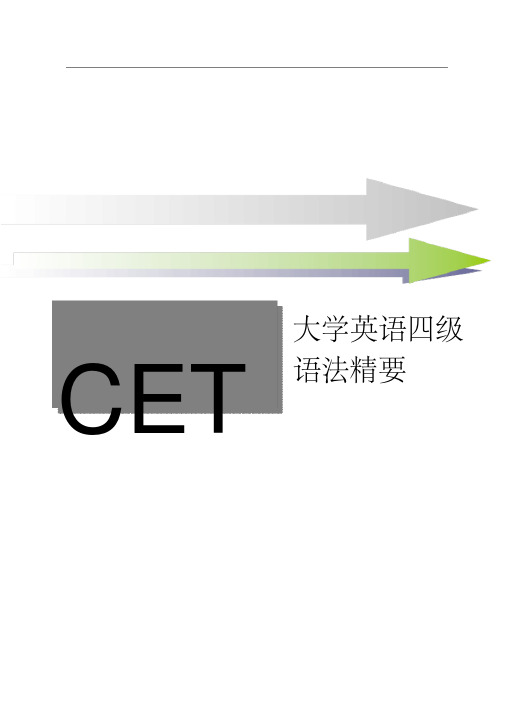
CET大学英语四级语法精要大学英语四级语法精要Ⅰ动词(时态,语态,用法,省略,一致性等)1.时态1)现在完成进行时态(have/has been+-ing分词构成):动作或状态从过去某时开始,继续到现在,可能继续下去,也可能刚刚结束.I’ve been writing letters for an hour.I’ve been sitting in the garden.2)过去完成进行时(由had been+ing分词构成):过去某个时刻以前一直在进行的动作I’d been working for some time when he called.We had been waiting for her for two hours by the time she came.3)将来完成进行时:将来某个时刻以前一直在进行的动作.By next summer,he will have been working here for twenty years.In another month’s time she’ll have been studying here for three years.4)将来完成时(由shall/will have+过去分词构成):将来某时会业已发生的事.I shall have finished this one before lunch.They’ll have hit the year’s target by the end of October.2.语态1)可以有两种被动结构的类型,例如:He was said to be jealous of her success.It was said that he was jealous of her success.能同时适用于上述两个句型的主动词通常都是表示“估计”,“相信”等意义的动词,常见的有assume,believe,expect,fear,feel,know,presume,report,say,suppose,understand等.It is supposed that the ship has been sunk.The ship is supposed to have been sunk.担当be supposed to与不定式的一般形式搭配时往往表示不同的意义.例如:Why are you driving so fast in this area?You are supposed to know the speed to know the speed limit.(你应该晓得速度限制)2)双宾语及宾补结构的被动语态a)双宾语结构的被动语态:双宾语结构变为被动语态时,可以把主动结构中的一个宾语变为主语,另一个宾语仍然保留在谓语后面,但多数是把间接宾语变为主语.He was asked a number of questions at the press conference.Two days were allowed them for making the necessary preparations.b)宾补结构的被动语态:She was called Big Sister by everybody.Then he was made a squad leader.He was considered quite qualified for the job.The room was always kept clean and tidy.3.短语动词1)Vi+advThe plane took off two hours late.2)Vi+prepThey looked round the Cathedral.3)Vi+prep(有被动语态)She’s looking after her sister’s children.The children were always well looked after.4)Vi+adv+prepI began to look forward to their visits.5)Vt+O+advSome women choose to stay at home and bring up their children.The children were brought up by their mother.They took him on.6)Vt+adv+O(无被动语态)I am trying to give up smoking.7)Vt+O+prepWe talked Donald into agreement.4.省略1)在以as,than,when,if,unless等引导的从句中的省略:在有些状语从句中,如果谓语包含有动词be,主语又和主句的主语一致a),或者主语是it b),就常常可以把从句中的主语和谓语的一部分(特别是动词be)省略掉.a)Look out for cars when crossing the street.When taken according to the directions,the drug has no side effects.While there he joined in voluntary labour on a project.Although not yet six months old,she was able to walk without support.If not well managed,irrigation can be harmful.Though reduced in numbers,they gained in fighting capacity.This viewpoint,however understandable,is wrong.Enemies,once discovered,were tightly encircled and completely wiped out.She hurriedly left the room as though/if angry.She worked extremely hard though still rather poor in health.Fill in the application as instructed.Whenever known,such facts should be reported.The documents will be returned as soon as signed.He said that no acrobat could ever perform those daring feats unless trained very young.Once having made a promise,you should keep it.b)If necessary I’ll have the letter duplicated.Fill in the blanks with articles where(ver)necessary.If possible,I should like to have two copies of it.As scheduled,they met on January20at the Chinese Embassy.2)在以than a)或as b)引起的从句中,常会有一些成分省略.a)He told me not to use more material than(it is)necessary.We should think more of the collective than of ourselves.b)They worked with as much enthusiasm as young people(did).He is now a vice-manager,but still often works in the kitchen as before.Their training is free,as is all education.We will,as always,stand on your side.3)错误的省略His life is as fully committed to books as anyone I know.While standing there in her nightgown,two bullets struck the wall beside her.5.一致1)如果主语是单数,尽管后面跟有with,together with,as well as,as muchas,no less than,more than等引导的短语,谓语动词仍旧用单数形式.Terry,along with her friend,goes skating every Saturday.An expert,together with some assistants,was sent to help in this work.The captain,as well as the coaches,was disappointed in the team.2)代词作主语时的一致a)each,either,neither和由some,any,no,every构成的复合代词,都作单数看待.Each of us has something to say.Is everybody ready?Somebody is using the phone.Neither of us has gone through regular training.Has either of them told you?b)some,few,both,many等作复数c)some可后接复数,也可接单数,表示某一.none作复数看待时较多,但也有时作单数看待,主要看说话人脑中联系想到的是复数还是单数概念,但none在代表不可数的东西时总是看作单数:None of the books are easy enough for usNone of us seem to have thought of it.None(=not a single one)of us has got a camera.None(=nobody)has felt it more keenly than she did.None of this worries me.all和most可后接复数,也可接不可数名词(all of the…,most of the…),动词用单数.3)由and或both…and连接名词词组时,后用复数;由not only…but(also),either…or,neither…nor或or连接的并列主语,谓语通常和最邻近的主语一致.Not only the switches but also the old writing has been changed.My sister or my brother is likely to be at home.Either you or Mr Yang is to do the work.Neither my wife nor I myself am able to persuademy daughter to change her mind.如果一个句子是由there或here引导,而主语又不止一个,谓语通常也和最邻近的那个主语一致. There was carved in the board adragon and a phoenix.Here is a pen,a few envelopes and some paper for you.4)people,police,cattle,poultry(家禽),militia(民兵)等通常都用作复数.Cattle are grazing on the pasture.The police are looking for him.有些集体名词有时作单数看待,有时作复数看待,主要根据意思来决定.very large.His family isn’tHis family are all music lovers.The committee meets twice a month.The committee aredivided in opinion.The audience was enormous.The audience were greatly moved at the words.有些名词单复数同形,可根据意思决定谓语动词的数:This new series is beginning next month.These new series are beginning next month.This species is now extinct.These speciesare now extinct.5)表示时间,重量,长度,价值等的名词,尽管仍是复数形式,如果作整体看待,动词也可用单数形式(当然用复数动词也是可以的):Three weeks was allowed for making the necessarypreparations.One hundred li was covered in a single night.6)其他问题a)书名,国家名用单数:Talesfrom Shakespeare is a book by Charles Lamb.b)学科名,如mathematics,economics用单数.c)many a或more than one所修饰的词作主语时,谓语动词多用单数形式:Many a person has had that kind of experience.More than one person has involved in the case.a number of后接复数,the number of后接单数:A number of books have been published on the subject.The number of books published on the subject is simply amazing.d)one of those后用单数.在“one of+复数名词+关系分句”结构中,关系分句中谓语动词的单复数形式在一般情况下有两形式,一是根据先行词采用复数形式:Joan is one of those people who go out of their way to be helpful.当one之前友the only等限定词和修饰语时,关系分句谓语动词根据one而定,即采用单数形式:He is the only one of those boys who is willing to take on another assignment.Ⅱ非谓语动词1.不定式1)形式主动形式被动形式一般式to do to be done完成式to have done to have been done进行式to be doing完成进行式to have beendoinga)完成式:不定式的一般形式所表示的动作,通常与主要谓语表示的动作(状态)同时(或几乎同时)发生,或是在它之后发生.假如不定式所表示的动作,在谓语所表示的动作(状态)之前发生,就要用不定式的完成式.I am glad to have seen your mother(=I am glad I have seenyour mother).(比较:I am glad to see you.)He is said to have written a new book about workers.He pretended not to have seenme.b)进行式:如果主要谓语表示的动作(状态)发生时,不定式表示的动作正在进行,这时要用不定式的进行式.quite recovered yet.You are not supposedto be working.You haven’texpect you to be waiting for us here.We didn’tHe pretended to be listening attentively.c)完成进行式:在谓语所表示的时间之前一直进行的动作,就要用不定式的完成进行式.The struggle was known to have been going for twenty years.We are happy to have been working with you.d)被动式:当不定式的逻辑上的主语是不定式所表示的动作的承受者时,不定式一般要用被动形式.It is an honour for me to be asked to speak here.She hated to be flattered.He wanted the letter to be typed at once.This is bound to be found out.There are a lot of things to be done.She was too young to be assigned such work.2)功用:不定式可以作主语(a),宾语(b),表语(c),定语(d)或是状语(e).a.To scold her would not be just.b.We are planning to build a reservoir here.c.One of our main tasks now is to mechanize agriculture.d.Do you have anything to declare?e.We have come to learn from you.3)不带to的不定式:a)在“动词+宾语+不定式”结构中,如果动词是表示感觉意义的see,hear,watch,smell,feel,notice等,或是表示“致使”意义的have,make,let等,其后的不定式结构不带to.John made her tell him everything.这类结构转换为被动语态时,后面的不带to的不定式一般还原为带to的不定式.She was made to tell him everything.b)在had better,had best,would rather,would sooner,would just as soon,might(just)as well,cannot but等搭配之后,动词不定式也不带to.I’dr ather not have eggs and bacon for breakfast.They cannot but accept his term.c)在make do,make believe,let drop,let fall,let fly,let slip,let drive,let go of,let there be,hear say,hear tell,leave go of等固定搭配中,用不带to的动词不定式.John let fly a torrent of abuse at me.I’ve heard tell of him.d)在动词help(或help+宾语)之后可用不带to的不定式,也可用带to的不定式.Can I help(to)lift this heavy box?e)在介词except,but之后,如果其前有动词do的某种形式,不定式一般不带to,反之带to. There is nothing to do except wait till it stops raining.Smith will do anything but work on a farm.n o choice but to wait till it stops raining.There’sf)连词rather than,sooner than置于句首时,其后的不定式不带to.Rather than push the book back as he wanted to do,he forced himself to pick it up.出现在句中其他位置时,其后的不定式有时带to,有时不带to.He decided to write rather than telephone.The manager believes it is important to invest in new machinery rather than to increase wages.g)用作补语的动词不定式,如果主语是由“all+关系分句”,“thing+关系分句”,“what分句”或“thing+不定式结构”等构成,并带有do的某种形式,这时,作为主语补语的不定式可以省to,也可以不省.What he will do is(to)spoil the whole thing.All you do now is complete the formThe only thing I can do now is go on by myself.The thing to do now is clear up this mess.The least I can do is drive everybody else closer to the issue.4)不定式的其他用法a)too…to结构通常表示否定意义:She was too young to understand all that.enough…to结构则表示肯定意义:She was not old enough to understand all that.not too,but too,all too,only too等和不定式连用时,不定式一般不表示否定意义:He’sonly too pleased to help her.so…as(to)这种结构也可用不定式作状语:Be so kind as to drop in some time when you are free.b)如果要说明不定是表示的动作是谁做的,可以在不定式前加一个for引起的短语:It is not hard for one to do a bit of good.It is a great honour for us to be present at this rally.在以某些形容词(如kind,good,nice,wise,unwise,clever,silly,wrong,right,foolish,stupid, careless,considerate,rude,naughty,impolite等)作表语时,不定式前可加一个of引起的短语,来说明不定式指的是谁的情况:kind of you to think so much of us.It’s(It is)Awfully good of you to come and meet us.very nice of you to be so considerate.It’sIt’sunwise of them to turn down the proposal.2.V+ing形式(现在分词及动名词)1)形式a)完成式:如果要表示动名词代表的动作在谓语所表示的动作之前发生,通常用动名词的完成形式.mention having met me.He didn’tI regret not having taken her advice.在某些动词后(或成语中),常用(或可以用)动名词的一般形式,尽管动作是在谓语所表示的动作之前发生的.Excuse me for coming late.remember ever seeing him anywhere.I don’t现在分词的完成式主要用在状语中,表示这动作在谓语所表示的动作之前发生.Having been there many times,he offered to be our guide.Having found the cause,they were able to propose a remedy.另外,独立结构也可用现在分词的完成形式.The guests having left,they resumed their discussion.The children,having eating their fill,were allowed to leave the table.b)被动式:当一个动名词逻辑上的主语所表示的是这动作的对象时,动名词一般要用被动形式. His being neglected by the host added to his uneasiness.bear being made fun of like that.He couldn’t但要注意,在want,need,deserve,require等动词后,尽管表示的是被动的意思,却用动名词的主动形式.My pen needsfilling.The point deserves mentioning.This problem requires studying with great care.在worth这个形容词后情形也是这样.Her method is worth trying.现在分词的被动式可以用来作定语,宾语补足语,状语及用于独立结构中.This is one of the experiments being carried on in our laboratory.You’llfind the topic being discussedeverywhere.very well refuse.Being asked to give aperformance,she couldn’tThese are sold at reduced prices,the defects always being pointed out to the customers.c)完成被动式:如果表示的动作在谓语表示的动作之前发生,有时需要用动名词的完成被动式.I don’tremember having ever been given a chance to try this method.但在多数情况下都避免使用这一形式,而用一般被动形式代替,以免句子显得累赘.现在分词的完成被动式一般用来作状语或用于独立结构中.Having been given such a good chance,how could she let it slip away?The decision having been made,the next problem was how to make a good plan.All the compositions having been written and collected,the teacher sent the students home.2)句法功用a)作主语:Walking is good exercise.nice talking to you.It’sThere is no denying the fact that the new method has greatly raised labour productivity.b)作宾语:Your shoes needpolishing.d elay sending the tractors over.You mustn’tHe avoided giving us a definite answer.c)作介词宾语:动名词作介词宾语用的时候最多.它常可以用在某些成语后面,常见的有:insist on,persist in,think of,dream of,object to,suspect…of,a ccuse…of,charge…with,hear of, approve of,prevent…from,keep…from,stop…from,refrain from,be engagedin,look forward to, opposed to,depend on,thank…for,feel like,excuse…for,aim at,devote…to,set about,spend…in, get(be)used to,be fond of,be capable of,be afraid of,be tired of,be sick of,succeed in,be interested in,feel(be)ashamedof,be proud of,be keen on,be responsible for.d)作表语:The real problem is getting to know the needsof the people.动名词和不定式都可以作主语或表语.一般说来,在表示抽象的一般的行为时多用动名词;在表示具体某词动作,特别是将来的动作时,多用不定式.e)作宾语补足语:分词可以在see,hear,notice,watch,feel,find,keep,get,have等动词后作宾语补足语.The words immediately set us all laughing.Once we caught him dozing off in class.His remark left me wondering what he was driving at.在see,hear,feel,watch,notice等动词后,及可用现在分词,也可用不定式构成宾语补足语.用现在分词时,表示动作正在发生,用不定式时表示动作发生了.Do you hear someone knocking at the door?Yes,I did.I heard him knock three times.f)作状语:现在分词作状语时,通常都表示主语正在进行的另一动作,来对谓语表示的主要动作加以修饰或作为陪衬.I ran out of the house shouting.I got home,feeling very tired.Driving to Chicago that night,I was struck by a sudden thought.现在分词短语有时可以用作状语表示原因,相当于一个表示原因的状语从句.get in touch with her.Not knowing her address,we couldn’tSeeing nobody at home,she decided to leave them a note.want to go to the cinema.Having already seen the film twice,she didn’t现在分词短语有时可用作时间状语,相当于when引起的从句:help thinking of those memorable days they spent together.Seeing those pictures,he couldn’t如果两个动作是完全同时发生的,多用when或while加分词这种结构.Be careful when crossing the street.When leaving the airport,they waved again and again to us.She got to know them while attending a conference in Beijing.3)前面带有代词或名词的动名词结构:一个动名词前面可以加一个物主代词(或名词的所有格结构),来表示这个动名词逻辑上的主语.Their coming to help was a great encouragement to us.Our sole worry is your relying too much on yourself.Do you mind my reading your paper?They insisted on my staying there for supper.如果不是在句子开头,这个结构常常可以用名词的普通格(或人称代词宾格),这比用所有格更自然一些.I don’tm ind him going.She hates people losing their temper.help,mind,admit,enjoy,leave off, 4)只能用动名词作宾语的动词:suggest,finish,avoid,stop,can’trequire,postpone,put off,delay,practise,fancy,excuse,pardon,advise,consider,deny,endure, escape,miss5)既可用动名词,也可用不定式作宾语的动词:love,like,hate,dislike,begin,start,continue,intend,a ffordattempt,can’tb ear,propose,want,need,remember,forget,regret,neglect,try,deserve,can’t等.有时两种结构之间意义差别不大,有时却有不同的意思.在remember,regret,want,try等词后差别是比较明显的.I remember seeing her once somewhere.I must remember to take my notebooks with me.I regret not having accepted your advice.I regret to say I haven’tgiven you enough help.want(need)to come.She doesn’tThe house wants(needs)cleaning.We must try to get everything done in time.t ry doing the work some other way.Let’s6)悬垂修饰:分词作状语时,表示的必须是主语的一个动作或状态.Walking through the park,we saw a lot of flowers.(walking是we的动作,正确)Walking through the park,the flowers looked very beautiful.(错误)Standing on the tower,we could see the whole city.(正确)Standing on the tower,the whole village could be seen.(错误)3.分词1)意义:过去分词通常来自及物动词,带有被动意义和完成意义;而现在分词有的来自及物动词,有的来自不及物动词,通常带有主动意义和未完成意义.frozen food a freezing winda bored traveller a boring journeya lost cause a losing battlea conquered army a conquering armya finished article the last finishing touchthe spoken word a speaking birda closed shop the closing houra recorded talk a recording machine来自不及物动词的过去分词很少能单独用作前置修饰语,能作这样用的仅限于下面几个词,仅表示完成意义,不表示被动意义.the risen sun,fallen leaves,faded/withered flowers,returned students,retired workers,departed friends,escapedprisoners,the vanished jewels,newly-arrived visitors用作后置修饰语的过去分词一般都带有修饰语或其他成分,在意义上相当于关系分句.Most of the people invited to the reception were old friends.2)句法作用a)作定语:distinguished guest贵宾,unknown heroes无名英雄,armed forces武装部队,cannedfood罐头食品,boiled water开水,steamedbread馒头,stricken area灾区分词还可构成合成词作定语:simply-furnished room陈设简单的房间,clear-cut answer明确的答复, highly-developed industry高度发展的工业,heartfelt thanks衷心的感谢,hand-made goods手工制品,man-made satellite人造卫星b)作补足语:可以带过去分词作宾语补足语的动词有:see,hear,feel,find,think等表示感觉和心理状态的动词.I saw the students assembled in the hall.We found her greatly changed.make,get,have,keep等表示”致使”意义的动词:I have my hair cut every ten days.She got her bad tooth pulled out.Please keep us informed of the latest developments.like,want,wish,order等表示希望,要求,命令等意义的动词:want any of you(to be)involved in the scandal.I don’tHe won’tlike such questions(to be)discussed at the meeting.c)过去分词短语常用作状语,修饰谓语,很多都说明动作发生的背景或情况.Guided by these principles,they went on with the work,Delighted with her work,they made her the general manager.过去分词短语也可作状语表示原因,相当于一个表示原因的状语从句.Influenced by his example,they performed countless good deeds.有时也可说明动作发生的时间,相当于一个表示时间的状语从句.This method,tried in areas near Shanghai,resulted in a marked rise in total production.间或也可表示一个假设的情况,相当于一个条件从句.Given closer analysis,we can see this is totally wrong.偶尔也可用来代替一个“让步”状语从句.Picked20years a year,it grows tired only after40or50years.d)独立结构:在用分词短语作状语时,它逻辑上的主语一般必须与句子的主语一.致.但有时它也可以有自己独立的逻辑上的主语,这种结构称为独立结构,一般表示一种伴随的动作或情况.He rushed into the room,his face covered with sweat.有时可以表示时间:Late that autumn,his work finished,he prepared to return to his institute.表示原因:Her eyesdimmed with tears,she did not see him enter.条件:All things considered,her paper is of greater value than yours.Ⅲ虚拟语气1.that从居中:1)wish,would rather(sooner),had better:I wish I were as strong as you.I wish I had paid more attention to our pronunciation.I wish I remembered the address.I would rather they came tomorrow(you had gone there too).I had rather(that)you told him than I did.2)suggest,order,demand,propose,command,request,desire,insist等动词后的宾语从句:The commander ordered that all civilians(should)be evacuated.He asked that he be given an opportunity to try.She urged that he write and accept the post.3)it is desired,it is suggested,it is requested,it was ordered,it was proposed,it is necessary,it isimportant,it hasbeen decided等结构后的主语从句中.It was arranged that they leave the following weekIt will be better that we meet some other time.4)suggestion,motion,proposal,order,recommendations,plan,idea等后面的表语从句和同位语从句:His sole requirement is(was)that thy system be adjusted.2.在某些句型中1)it is time thatIt is time that we went(或should go)to bed.It is high time we(should)put an end to this controversy.2)as if(though)引起的从句:They talked(are talking)as if they had been friends for years.It seems as if it was(were)spring today.He acts(acted)as if(though)he were(was)an expert.3)以lest,for fear that和in case引起的从句(这时谓语多用should+动词原形):He took his raincoat with him lest it should rain.He put his coat over the child for fear that(或lest)he should catch cold.I’ll keep a seat for you in caseyou should needit.4)以whatever,whoever,no matter what这类代词或词组引起的从句(这时,谓语多用may加动词原形构成):Whatever defects he may have,he is an honest man.Come what may,we will go ahead.不管发生什么情况,我们都要干下去.I accept that he is old and frail;be that as it may,he’ss till a good politician.我承认他年老体衰,然而尽管如此,它仍是优秀的政治家.3.条件句1)虚拟条件句主要有下面两类:a)表示现在及将来情况(表示纯然假设或实现的可能性不大的情况):谓语主要形式如下(be多用were这个形式):从句主句过去式would+动词原形If I were you,I wouldn’tl ose heart.How nice it would be if you could stay a bit longer.b)表示过去情况的虚拟条件句(与事实完全相反的假设情况),谓语主要形式如下:从句主句had+过去分词would have+过去分词She would have come if we had invited her.taken your advice,I would havemade a bad mistake,If I hadn’tYou wouldn’th ave caught cold if you had put on more clothes.2)有时候,条件从句表示的动作和主句表示的动作,发生的时间是不一致的(如一个是过去发生的,一个是现在发生的).这时,动词的形式要根据表示的时间来调整.这种句子可以称为错综时间条件句.If he had received six more votes,he would be our chairman now.got everything ready by now,we should be having a terrible time tomorrow.If we hadn’t3)有时假设的情况并不以条件从句表示,而是通过一个介词短语来表示.Without music,the world would be a dull place.We could have done better under more favorable conditions.That would have been considered miraculous in the past.But for the storm,we should have arrived earlier.4)如果条件句从句中包含有were,had,should或could,有时可把if省略掉,并把were,had,should或could放在主语前面.Had we made adequatepreparation,we might have succeeded.Should there be a flood,what should we do?Were it not for their assistance,we would be in serious difficulty.Ⅳ介词1.合成介词和复杂介词1)合成介词:inside,into,onto,out of,outside,throughout,upon within,without2)复杂介词:according to,along with,apart from,as for,as to,becauseof,by means of,in frontof,in spite of,instead of,in accordance with,on account of,on behalf of,owing to,due to,together with,up to,with regard to,prior to等2.介词在句末:This is what he is interested in.Does everyone has a seatto sit on?3.名词加介词(n+prep)1)某些名词之后要求用某些介词:solution to,faith in,glance at,needfor2)某些名词之前要求用某些介词:on one’sguard,at one’srequest,in all probability,to mydelight4.动词加介词1)Vi+prep:prevail on,appeal to,fall into,apply for,touch upon2)Vt+O+prep:lay emphasison,take advantage of等3)Vi+adv+prep:I don’tw ish to break in on your thoughts.The family came up against fresh problems.You’re not telling me the whole story.You’re holding out on me.She got off with him soon after she began to work at the institution.4)Vt+O+adv+prep:take your resentment out on me.You shouldn’tput the shortage down to bad planning.We shouldn’t5.形容词加介词about---anxious,careful,careless,certain,considerate,enthusiastic,guilty,happy,mad,particular, sad,sure,timid,unhappy,etcat---awkward,bad,clever,disappointed,disgusted,good,marvellous,quick,skilful,skilled, useless,weak,etcfor---convenient,eligible,grateful,homesick,hungry,necessary,noted,perfect,responsible,etcfrom---evident,exempt,inseparable,safe,tired,etcin---deficient,expert,liberal,quick,rich,successful,weak,etcof---apprehensive,characteristic,critical,destructive,envious,hard,inconsiderate,impatient, dependent,jealous,positive,scared,sensible,short,sick,suspicious,typical,worthy,etcon---dependent,keen,intent,etcto---acceptable,accessible,agreeable,alive,attentive,blind,comparable,courteous,deaf, destructive,essential,favourable,hostile,indifferent,married,obedient,parallel,preferable,related, responsible,sensitive,suitable,unjust,etcwith---awkward,bored,careful,disappointed,generous,identical,ill,impatient,popular,sick, wrong,etcⅤ连词1.并列连词1)表示意义的引申:and,both…and,not only…but(also),as well as,and…as well,neither…nor2)表示选择:or,either…or3)表示转折:but,while,whereas,yet,however/nevertheless(也可认为是副词)4)表示因果:for,so,therefore,hence2.从属连词1)表示时间:when,while,as,after,before,since,until(till),as soon as,once2)表示原因:because,as,since,now that,seeing that3)表示条件:if,unless,in case,provided(that),suppose,as long as,on condition(that),4)表示其他关系:(al)though,than,as/so…as,lest,in order that,so…thatⅥ定语从句1.限制和非限制性定语从句:限制性定语从句是名词词组不可缺少的一个组成部分,去掉了会造成病句或意义不明确;非限制性定语从句属于补充说明性质,去掉了不会影响主要意义,通常用逗号与它的先行词分开.The boys who wanted to play football were disappointed when it rained.The boys,who wanted to play football,were disappointed when it rained.如果定语从句的先行词是专有名词,或是带有形容词性物主代词(my,his,etc)或形容词性指示代词(this,that,etc)作限定词,其后的定语从句通常都是非限制性的:Mary Smith,who is in the corner,wants to meet you.Her mother,who had long suffered form arthritis,died last night.All these books,which have been donated by visiting professors,are to be used by the postgraduates.在非限制性定语从句中只能用who/whom指人,用which指物,通常不用that替代.My father,who had been on a visit to America,returned yesterday.All the books,which had pictures in them,were sent to the little girl.2.定语从句的引导词1)that,who,whom:非限制性定语从句,如果修饰人,一般用who,有时用that(作主语时用who较多).如果关系代词在从句中作宾语,就应当用宾格whom或that,但在大多数情况下都可以省略掉,在口语中可用who代替whom.Here is the man(whom)you’ve been looking for.He is a man(that)you can safely depend on.The people(who/that)you were talking to were Swedes.There are some people here who I want you to meet.但在介词后只能用whom:This is the man to whom I referred.但在口语中一般都把介词放到句子后面去,这时可用that,但省略时更多一些.Have you met the person about whom he was speaking?Have you met the person(that)he was speaking aboutThe girl to whom I spoke is my cousin.The girl(who/that)I spoke to is my cousin.2)限制性定语从句如果修饰“物”,用关系代词that的时候较多,也有时用which..当这个代词在从句中是用作宾语时,在绝大多数情况下都是省略的,特别是口语中(尤其是当被。
我在学校的一天作文英语现在进行时大学
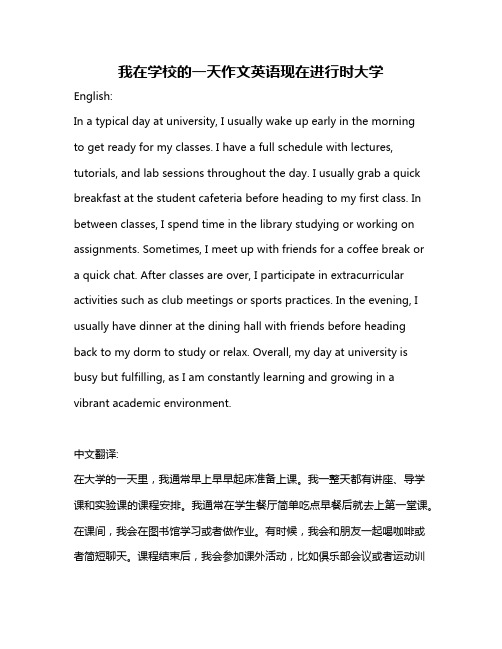
我在学校的一天作文英语现在进行时大学English:In a typical day at university, I usually wake up early in the morningto get ready for my classes. I have a full schedule with lectures, tutorials, and lab sessions throughout the day. I usually grab a quick breakfast at the student cafeteria before heading to my first class. In between classes, I spend time in the library studying or working on assignments. Sometimes, I meet up with friends for a coffee break or a quick chat. After classes are over, I participate in extracurricular activities such as club meetings or sports practices. In the evening, I usually have dinner at the dining hall with friends before heading back to my dorm to study or relax. Overall, my day at university is busy but fulfilling, as I am constantly learning and growing in a vibrant academic environment.中文翻译:在大学的一天里,我通常早上早早起床准备上课。
大学英语四级必考语法汇总
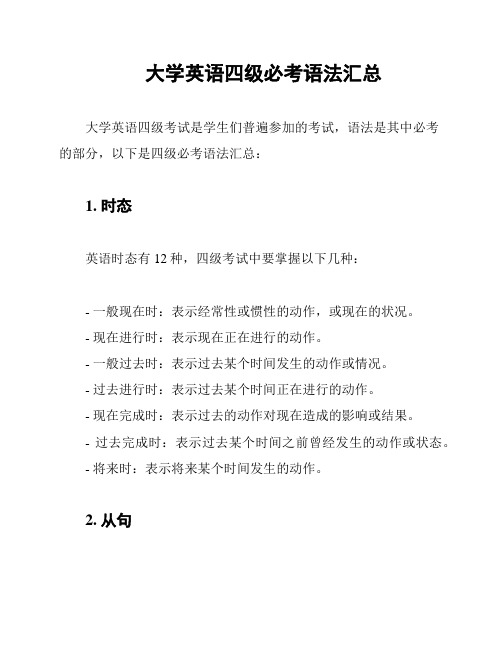
大学英语四级必考语法汇总大学英语四级考试是学生们普遍参加的考试,语法是其中必考的部分,以下是四级必考语法汇总:1. 时态英语时态有12种,四级考试中要掌握以下几种:- 一般现在时:表示经常性或惯性的动作,或现在的状况。
- 现在进行时:表示现在正在进行的动作。
- 一般过去时:表示过去某个时间发生的动作或情况。
- 过去进行时:表示过去某个时间正在进行的动作。
- 现在完成时:表示过去的动作对现在造成的影响或结果。
- 过去完成时:表示过去某个时间之前曾经发生的动作或状态。
- 将来时:表示将来某个时间发生的动作。
2. 从句从句是指一个完整的句子,它在句子中充当某个成分,四级考试中要掌握以下几种:- 定语从句:修饰某个名词或代词。
- 主语从句:作为主语的从句。
- 宾语从句:作为宾语的从句。
- 同位语从句:阐述前面名词或代词的内容。
- 状语从句:修饰或补充主句的内容。
- 结果状语从句:表示结果的从句。
- 让步状语从句:表示让步的从句。
- 条件状语从句:表示条件的从句。
3. 词性和词组四级考试中需要掌握名词、代词、动词、形容词和副词的用法,以及一些固定用法的词组,例如:- be based on:基于。
- be fond of:喜欢。
- as soon as possible:尽快。
- break the ice:打破僵局。
4. 语态英语语态有两种,四级考试中需要了解和区分主动语态和被动语态,以及两种语态在句子中的变化。
5. 语气英语语气有三种,四级考试中需要了解和区分陈述语气、祈使语气和虚拟语气。
以上就是大学英语四级必考语法的汇总,希望对大家备考有所帮助。
大一大学英语知识点

大一大学英语知识点一、词汇与语法1. Parts of Speech (词性)- Noun (名词): 表示人、物、地点、概念等。
- Pronoun (代词): 替代名词,包括人称代词、物主代词等。
- Verb (动词): 表示动作、状态或存在。
- Adjective (形容词): 修饰名词或代词。
- Adverb (副词): 修饰动词、形容词或其他副词。
- Preposition (介词): 表示方位、时间、原因等关系。
- Conjunction (连词): 连接短语、词或句子。
- Interjection (感叹词): 表示强烈情感或感叹。
2. Tenses (时态)- Simple Present Tense (一般现在时): 描述当前状态或习惯性动作。
- Present Continuous Tense (现在进行时): 描述正在进行的动作。
- Simple Past Tense (一般过去时): 描述已经发生的过去事件。
- Past Continuous Tense (过去进行时): 描述过去某个时间段正在进行的动作。
- Simple Future Tense (一般将来时): 描述将来会发生的事件。
- Future Continuous Tense (将来进行时): 描述将来某个时间段正在进行的动作。
3. Sentence Structure (句子结构)- Subject + Verb + Object (主+谓+宾): 基本句子结构。
- Subject + Verb (主+谓): 无宾语的句子结构。
- Subject + Verb + Complement (主+谓+补语): 表示状态或特征。
- Subject + Verb + Indirect Object + Direct Object (主+谓+间接宾+直接宾): 表示动作的接收者。
4. Conditional Sentences (条件句)- Zero Conditional (零条件句): 表示真实情况。
大学英语大一重要知识点

大学英语大一重要知识点一、词汇与语法知识1. 时态与语态在英语中,时态和语态是非常基础且重要的知识点。
时态包括过去、现在和将来三种基本时态,以及其对应的进行时态、完成时态和完成进行时态。
语态则包括主动语态和被动语态,通过语态的变化,可以使句子的表达更加灵活准确。
2. 名词与代词名词是指人、事、物和抽象概念的名称,是构成句子主要成分的一种词类。
代词则是用来代替名词的词,可以使句子更加简洁明了。
3. 动词与动词时态动词是表示动作、状态或存在的词类。
了解动词时态能够帮助学生正确使用各种动词形式,包括一般现在时、一般过去时、一般将来时、现在进行时、过去进行时、将来进行时、现在完成时等。
4. 形容词与副词形容词用来修饰名词,描述事物特征或属性;副词则用来修饰动词、形容词或其他副词,表示方式、程度等。
5. 介词与冠词介词用来表示名词与其他词之间的关系,冠词用来限定或指示名词的范围。
二、阅读理解与写作技巧1. 阅读理解阅读理解是指通过阅读理解文章,获取相关信息,理解文章主旨和细节,并进行全面准确的解读和理解。
大一学生需要通过大量的阅读练习来提高阅读理解能力。
2. 写作技巧写作技巧包括写作结构、段落发展、语言表达等方面。
在写作过程中,要合理组织文章结构,使用恰当的连接词、句子和段落过渡词,用准确丰富的词汇和句式表达思想。
三、口语表达与听力技巧1. 口语表达通过口语练习,提高口语表达能力是大学英语大一的重要任务之一。
学生可以多参加口语交流活动,积极练习口语表达,提高语感,并注意语音语调的准确运用。
2. 听力技巧听力是英语学习的重要组成部分。
大一学生需要通过大量听力材料的听取和理解,提高听力技巧和听力水平。
可以使用一些听力技巧,如抓住关键词、注意上下文等,以提高听力效果。
四、文化与背景知识1. 英美文化了解英美文化是学习英语的重要内容之一。
大一学生可以通过学习英美文化的差异和相似之处,拓宽视野,提高跨文化交际的能力。
我在学校的一天作文英语现在进行时大学

我在学校的一天作文英语现在进行时大学全文共3篇示例,供读者参考篇1A Typical Day at UniversityThe shrill beeping of my alarm jolts me awake at 7am. I'm groaning and rubbing the sleep from my eyes as I'm forcing myself to get up for another day of classes. As I'm stumbling out of bed, my roommate Sam is already dressed and packing up her backpack. "Morning, sleepyhead!" she calls out cheerfully. I mumble something incoherent in response as I'm shuffling to the bathroom to get ready.After I'm brushing my teeth and splashing some water on my face, I'm starting to feel a bit more awake. I hastily throw on a t-shirt and hoodie, not caring too much about my appearance since I'm simply heading to lectures. Sam and I are walking briskly across campus, the crisp autumn air nipping at our faces. The grounds are beautifully scenic, with vibrant leaves coating the ground and squirrels scampering about.We're approaching the humanities building where my 9am literature class is held. The hallways are packed with studentsrushing to their respective classrooms. I quickly find a seat towards the middle of the auditorium-style lecture hall, retrieving my notebook and pen from my backpack. The professor is already at the front, setting up her PowerPoint presentation on analyzing the great American novels.For the next hour and fifteen minutes, I'm diligently taking notes as she's lecturing, trying my best to keep up with her rapid Speech. My hand is cramping by the end from all the furious scribbling. Once dismissed, I'm shoving my materials back into my bag and hurrying off to my next class - anthropology in the social sciences building across campus.I arrive slightly breathless but still make it before the professor starts his lesson on cultural relativism. My friend Jamal saved me a seat and I'm grateful to plunk down beside him. This twice-weekly anthropology lecture is one of my favorite classes. The subject matter is fascinating as I'm learning about humans and their differences across societies and time periods.Two hours later, Jamal and I are starving so we're heading to the main dining hall for a late lunch. The large, open room is packed with rowdy students chowing down and socializing loudly. We're navigating through the chaos to the food stations, grabbing a couple of trays and plates. I'm piling my plate highwith a chicken Caesar salad, fries, and a cheeseburger while Jamal is opting for the vegan stir fry and vegetable soup. We find an empty table towards the back, digging into our food like typical hungry college students.After we're finishing our meals, I'm parting ways with Jamal to head to the library and crack open the books for a few hours of studying before my night class. The library is my favorite place on campus - a large, modern facility with ample spaces for quiet studying and group work. I'm claiming one of the cozy armchairs by a window on the fourth floor in the reading room. Spreading out my textbooks, notebooks, and laptop, I'm hunkering down to review my class notes from today and get a jumpstart on the assigned readings for next week.A few hours fly by as I'm diligently working, only stopping for a short break to grab a snack and refuel with a coffee from the cafe. Before I know it, I'm packing up my materials as it's time to head to my 7pm biology lab. This night class is kicking my butt - the labs are long and intense as we're conducting complicated experiments and analyzing our results. I'm meeting up with my lab partner Jordan and we're walking over to the science center together, both already dreading the three-hour lab session ahead.Finally, at 10pm, I'm leaving the science building completely drained and ready to call it a night. Luckily, I live right on campus so I'm just a short walk away from my dorm building. I'm trudging up the stairs to my third floor room, kicking off my shoes and collapsing onto my bed in exhaustion. After rapidly typing up and submitting a short writing assignment due tonight, I'm changing into my pajamas. Sam is still up working at her desk, so I'm whispering "good night" before curling up under my covers. My eyes are immediately growing heavy as I'm drifting off to sleep, already knowing my alarm will be going off way too soon for another packed day of college life.篇2A Typical Day at UniversityThe shrill sound of my alarm jolts me awake at 7am. I groan and hit snooze, hoping for a few extra minutes of sleep. But I know I need to get up and get ready for my 9am lecture. Reluctantly, I drag myself out of bed and into the shower to wake myself up.After getting dressed, I head to the dining hall to grab a quick breakfast before class. The tables are crowded with students grabbing coffee and bagels or pieces of fruit as fuel fortheir busy day ahead. I wolf down a bowl of cereal and a banana, trying not to spill on the books and papers crammed into my backpack.The quad is alive with activity as I make my way across campus to the lecture hall. Students are hurrying every which way, some looking bright-eyed and alert while others shuffle along zombie-like, clearly still half asleep. I pass a group tossing a frisbee back and forth, already making the most of the nice spring day.I find an open seat about halfway up the tiered lecture hall and pull out my laptop to take notes. The professor dives right in, firing away facts and figures at a rapid pace. I type furiously, trying to capture all the key points. An hour later, I leave the hall with a fresh stack of new information to process and understand for the upcoming midterm.With a break before my next class, I stop by the library to start working on a paper that's due next week. I settle into a quiet corner and spread my books and notes out in front of me. The words start to blur together as I stare at my laptop screen. I rub my eyes and take a sip of coffee, needing a jolt of caffeine to power through.All too soon, it's time for my afternoon biology lab. I pack up and make my way across campus again, dodging clusters of students lounging on the lawns and walkways in the sunny weather. The lab room is a blur of activity - bunsen burners firing up, safety goggles being distributed, and lab partners chattering about the experiment at hand. We spend the next two hours carefully following the step-by-step procedure, making observations and recording results.Finally finished after cleaning up our lab station, I'm starving and my stomach is growling loudly. I stop by the food court to grab a quick lunch - a greasy slice of pizza and a soda to tide me over until dinner. Then it's back to the library for more studying and paper writing until my evening class at 6pm.I arrive at the cozy seminar room, thankful for the small class size after the morning's huge lecture. We launch into a lively group discussion, analyzing the assigned reading from multiple perspectives. I find myself getting fired up, passionately defending my interpretation of the text. The two hour class period flies by as we grapple with the complex themes and ideas.Afterwards, I'm mentally drained but can't go back to my dorm room just yet. I have a couple of hours until the library closes at 10pm, so I settle back into a quiet corner to crank awayat my paper some more. I'll grab dinner from the dining hall whenever I need a break to refuel.The words continue to blur together as I grow punchy from staring at my laptop for so long. My eyelids feel heavy but I power on, downing another coffee and snacking on a candy bar from the vending machine to re-energize myself.With 15 minutes before closing time, I finally save my work and start packing up. I shuffle back to my dorm room, bone-tired but satisfied with my progress for the day. After getting ready for bed, I set my alarm for the next morning and collapse onto my pillow, falling instantly into a deep sleep.Before I know it, the shrill beeping will jolt me awake again at 7am to begin another packed day. The cycle will repeat - classes, studying, activities, meals squeezed in whenever I can find the time. But I won't have it any other way. The endless hustle and juggling act is just part of the typical day in the life of a university student.篇3A Typical Day in My University LifeThe shrill sound of my alarm clock jolts me awake at 7am. As I slowly peel my eyes open and the grogginess fades away, I'mreminded of the busy day that lies ahead. Being a university student is no easy feat, but I've learned to thrive on thisfast-paced lifestyle over the past couple of years.After a quick shower to jumpstart my morning, I head to the dining hall for breakfast. The aroma of freshly brewed coffee and warm pastries wafts through the air, luring in the stream of sleepy-eyed students. I grab a bagel and a banana, knowing that I'll need the sustenance to power through my morning classes.With my backpack slung over my shoulder, I make my way across campus, weaving through the throngs of students hurrying to their respective destinations. The grounds are alive with activity, a stark contrast to the tranquil evenings when the campus seems to slumber.My first class of the day is Introduction to Macroeconomics at 9am. As I take my seat in the lecture hall, the professor wastes no time delving into the intricacies of economic models and theories. I diligently take notes, occasionally raising my hand to ask a clarifying question or offer my perspective on the subject matter.After an hour and a half of intense focus, the class concludes, and I have a short break before my next lecture. I spend this timereviewing my notes or catching up on assigned readings in the library's quiet study area.At 11am, I find myself in a crowded seminar room for my English Literature course. We engage in lively discussions, dissecting the metaphors and symbolism woven into the works of renowned authors. I relish these intellectual exchanges, as they challenge me to think critically and consider multiple perspectives.The afternoon brings a welcome respite in the form of a two-hour break. I usually grab a quick lunch at the student union before heading to the campus recreation center for a workout. Exercising not only keeps me physically fit but also provides a much-needed mental break from the rigors of academia.Feeling refreshed, I make my way to the computer lab for my Programming Fundamentals class. Here, I immerse myself in the world of coding, learning to write algorithms and solve complex problems through logical thinking. The satisfaction of successfully executing a program is unparalleled, and I find myself becoming increasingly fascinated by the intricacies of computer science.As the day draws to a close, I attend my final class, a seminar on Environmental Studies. We explore pressing issues such asclimate change, sustainable practices, and the impact of human activities on the planet. These discussions often spark passionate debates, and I find myself engaged in thought-provoking conversations with my classmates long after the class has ended.With my academic responsibilities fulfilled for the day, I head back to my dorm room to recharge and prepare for the evening ahead. After a quick meal, I dive into my assignments, tackling problem sets, writing essays, or conducting research for upcoming projects.However, university life is not solely about academics. In the evenings, I often attend club meetings or social events organized by various student organizations. Whether it's participating in a lively debate at the Political Science Club or attending a poetry reading hosted by the Literature Society, these extracurricular activities provide a welcome balance to my academic pursuits.As the night wears on, I find myself back in my room, hunched over my desk, burning the midnight oil to complete that last assignment or prepare for an upcoming exam. The gentle hum of my laptop and the occasional rustling of pages punctuate the silence as I immerse myself in my studies.Finally, as the clock strikes midnight, I reluctantly set aside my work and prepare for bed. As I drift off to sleep, I can't helpbut feel a sense of accomplishment and gratitude for the opportunities afforded to me by this incredible journey of higher education.Each day at the university is a whirlwind of intellectual stimulation, personal growth, and the pursuit of knowledge. While the demands are high and the workload can be daunting, I thrive on the challenge and the sense of purpose that comes with being a part of this vibrant academic community.。
我在学校的一天作文英语现在进行时大学
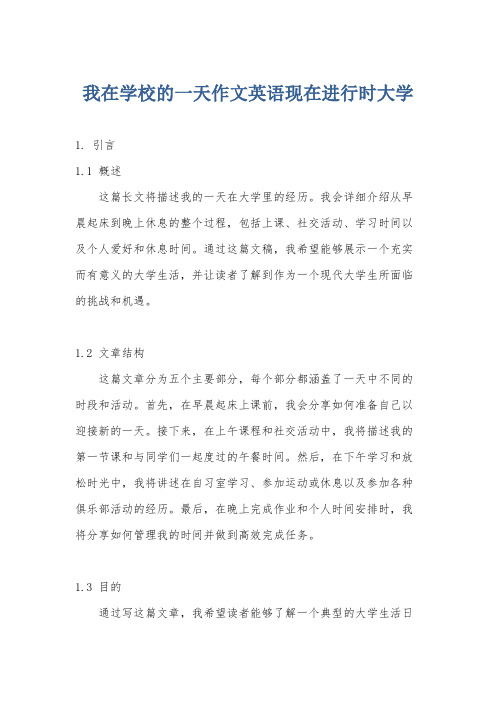
我在学校的一天作文英语现在进行时大学1. 引言1.1 概述这篇长文将描述我的一天在大学里的经历。
我会详细介绍从早晨起床到晚上休息的整个过程,包括上课、社交活动、学习时间以及个人爱好和休息时间。
通过这篇文稿,我希望能够展示一个充实而有意义的大学生活,并让读者了解到作为一个现代大学生所面临的挑战和机遇。
1.2 文章结构这篇文章分为五个主要部分,每个部分都涵盖了一天中不同的时段和活动。
首先,在早晨起床上课前,我会分享如何准备自己以迎接新的一天。
接下来,在上午课程和社交活动中,我将描述我的第一节课和与同学们一起度过的午餐时间。
然后,在下午学习和放松时光中,我将讲述在自习室学习、参加运动或休息以及参加各种俱乐部活动的经历。
最后,在晚上完成作业和个人时间安排时,我将分享如何管理我的时间并做到高效完成任务。
1.3 目的通过写这篇文章,我希望读者能够了解一个典型的大学生活日程,并对在大学期间如何平衡学习与娱乐有所启发。
我将分享一些有效的时间管理技巧和个人经验,以帮助那些正在经历类似生活方式的人更好地应对他们面临的挑战。
同时,我也希望通过描述我的大学生活给予他人积极的动力和勇气,尤其是那些即将进入或已经在大学里度过日子的人们。
2. 早晨起床上课前:早晨是一天的开始,对我来说尤为重要。
在这个部分,我会详细描述我在学校的一天开始时的准备和活动。
2.1 起床准备:通常,我的闹钟在早晨6点半准时响起。
尽管有时候我想多睡一会儿,但为了不迟到,我总是强迫自己从温暖舒适的被窝里爬出来。
第一件事就是打开窗帘,让阳光照进来。
这样做可以使我更容易清醒并提高精神状态。
然后,我去洗手间刷牙洗脸,并用冷水洗个澡。
这可以让我彻底清醒并恢复活力。
洗完后,我会换上干净整洁的校服,并整理头发。
2.2 早餐时间:吃早餐对于开始一天的活动非常重要。
因此,我努力保证每天都能有营养丰富的早餐。
通常,我的早餐包括一碗热粥或面条、一片面包和一杯牛奶。
有时候,如果时间允许,我还会切些水果作为补充。
一般现进行时的结构和用法
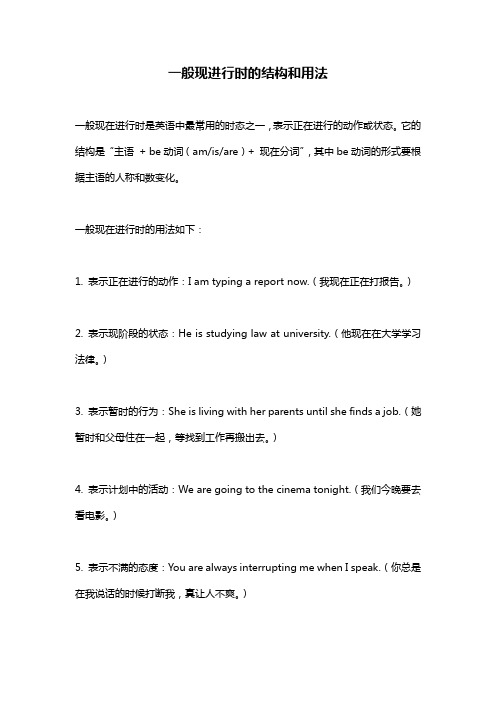
一般现进行时的结构和用法
一般现在进行时是英语中最常用的时态之一,表示正在进行的动作或状态。
它的结构是“主语+ be动词(am/is/are)+ 现在分词”,其中be动词的形式要根据主语的人称和数变化。
一般现在进行时的用法如下:
1. 表示正在进行的动作:I am typing a report now.(我现在正在打报告。
)
2. 表示现阶段的状态:He is studying law at university.(他现在在大学学习法律。
)
3. 表示暂时的行为:She is living with her parents until she finds a job.(她暂时和父母住在一起,等找到工作再搬出去。
)
4. 表示计划中的活动:We are going to the cinema tonight.(我们今晚要去看电影。
)
5. 表示不满的态度:You are always interrupting me when I speak.(你总是在我说话的时候打断我,真让人不爽。
)
6. 表示重复的动作:He is always forgetting his keys.(他总是忘记带钥匙。
)
7. 表示逐渐变化的状态:The weather is getting colder.(天气越来越冷了。
)
总之,一般现在进行时可以用来描述正在进行的动作或状态,以及暂时的行为、计划中的活动、不满的态度、重复的动作和逐渐变化的状态等。
大学英语语法--16种时态

英 语 的 16 种 时 态英语共有十六种时态,其表现形式如下(以study 为例) 一般时 进行时 完成时 完成进行时现在 study be studying have studied have been studying 过去 studied be studying had studied had been studying 将来 will study wil be studying will have studied will have been studying 过去将来would study would be studying would have studied would have been studying 一、一般时态 1、一般现在时(1)一般现在时表示没有时限的持久存在的动作或状态或现阶段反复发生的动作或状态,常和副词 usually ,often ,always sometimes , regularly ,near ,occasionally ,every year, every week 等连用。
例如: 1)The moon moves round the earth.. 2)Mr. Smith travels to work by bus every day. (2)在由after ,until ,before ,once ,when ,even if ,in case ,as long as ,as soon as ,the moment 以及 if ,unless 等引导的时间状语从句或条件状语从句中,通常用一般现在时代替将来时。
例如: 1)I will tell him the news as soon as I see him. 2)I will not go to countryside if it rains tomorrow. (3)某些表示起始的动词,某些表示起始的动词,可用一般现在时表示按规定、可用一般现在时表示按规定、可用一般现在时表示按规定、计划或安排要发生的动作,计划或安排要发生的动作,计划或安排要发生的动作,这类动词有:这类动词有:be ,go ,come ,start ,depart ,arrive ,begin ,leave 等。
大学进行时相声台词

大学进行时相声台词甲乙:尊敬的老师,亲爱的同学们,大家晚上好甲:今天很高兴站在这个舞台上,有大一的,有大二的,有大三的,有认识的有不认识的,先做一下自我介绍,我叫***,性别男,爱好女乙:得,您这什么爱好甲:我打小就喜欢乙:这可不好甲:这位,我搭档乙:哎,我甲:他叫****乙:正是本人,在这里给大家鞠躬了甲:大家看他这长相,就这脸就是一山的名字乙:啊什么山甲:长白山乙:去你的甲:要说我这搭档,相声说的好,是我们相声社中的姣姣者乙:我,我一新来得怎么能成佼佼者呢甲:就是有两只脚的人乙:咳,照您这么说大家都是姣姣者,说句实在化我这个搭档张的还真不一样,特别好看甲:那当然了,必须地乙:你给大伙看看你的侧面吧甲:动作乙:周杰伦,甲:肯定地乙:在给大伙看看另一个侧面吧甲:动作乙:梁朝伟甲:那必须滴啊乙:你在给大伙一个正面甲:刘德华吧乙:NONONO甲:那谁啊乙:灭绝师太甲:你才灭绝师太呢,就我这模样,绝对是一帅哥乙:就你涨得这么突然,也能属于我们帅哥行列里的甲:什么叫你们帅哥行列啊,让大家看看你那抽象的样乙:你还别不服,那你让大家评评里甲:行乙:在做的老师同学么,你们说,是我涨得帅,还是他涨得丑甲:不是,您这不是等于没说么乙:得,得咱俩还是别拌嘴了,你还是说说你作为咱11届新生刚入学的感受吧甲:要说刚经历完高考的我们最大的感受就是在学习上,咱大学里都提倡自主学习,都靠自觉乙:这对,要不怎么说是大学生呢甲:还记得高中那会我是从清煸炒鱿鱼的经验中成长过来的乙:怎么说甲:80分以下女子单打,70分以下男子单打,60分以下男女混合双打。
乙:具体点甲:80分以下老妈揍我,70分以下老爸揍我,60以下老爸老妈一起揍我。
乙:唉!我说怎么这么肥呢,原来肿的,呵呵甲:上边去不是那么回事,这大学里我们要好好学习,以后我要考研究生乙:你想的可够远的,那你打算考哪啊甲:我要看同学考哪,我一定要他们比下去乙:这心气还挺高甲:最可气就是我们班有个同学乙:他怎么了甲:你是不知道他长什么模样啊,刚来的时候啊,同学们都劝他乙:什么啊甲:地球很危险的,赶紧回火星吧乙:把人家当火星人了甲:大家说说我那位同学就长这模样,还想考北大乙:你说我呢甲:别急,开个玩笑,后来我就决定,我一定要考航空航天大学的研究生乙:为什么啊甲:我发誓我一定要研究出一架飞船乙:霍,好志向甲:把你送回火星去乙:去你的把甲:其实,我来大学就有一个梦想,就像以后去制造飞机,让飞机在中国普及,以后中国就没有公路了,出们全做公共飞机,上了飞机,投一块钱的钢镚,想去哪去哪乙:得了,您这是飞机啊甲:其实我也纳闷呢,这飞机怎么飞不起来呢,我到后边推他,还是不飞乙:这怎么回事啊甲:后来一看,我们老师在前面堵着呢!指着我的鼻子就说啊“***太不像话了,上课打瞌睡,还推着桌子跑”乙:原来你上课睡觉啊甲:其实啊,就是刚来大学啊,还不是太适应乙:还真是这么个道理甲:来到咱们文理学院这么长时间,受我们英语专业同学的影响,我特别爱学英语乙:这是好事甲:这英语啊,就要从平常的日常生活中学起,像日常生活中一些“吃的,使得,用的”乙:等会,您再说一遍甲:“吃的,使得,用的”乙:吃的,使得,用的,你分开说成么甲:我也没连着啊乙:那您连起来呢甲:我不愿意理你,我说“吃的,使得,用的”我没说“吃shi用的”乙:您这太恶心了甲:就说日常生活中吃的,苹果,apple乙:橘子呢甲:orange乙:香蕉甲:banana乙:那我考你个难点的吧甲:嗯,您说乙:爸爸甲:哎!乙:你哎什么甲:你不是叫我么乙:不带你这样玩得,那妈妈怎么说甲:mother乙:爷爷甲:father的father乙:那奶奶照您这么说不就是mother的mother了么甲:别逗了,那是姥姥乙:甲:奶奶叫father的mother,哇好神奇哟乙:上一边去,你泵在这丢人现眼了甲:对于我们这些新生来讲,最难忘的就是军训乙:不错,这是我们一们必修课甲:军训时候教官讲得好啊乙:怎么讲的甲:流血、流汗、不流泪乙:掉皮、掉肉,不掉队甲:一周的军训磨练了我们坚强的意志乙:时间虽短意义非凡甲:终于到了阅兵的时候了乙:我们迈着整齐的步伐,喊着嘹亮的口号甲:同志们好乙:首长好甲:同志们辛苦了乙:为人民服务甲:同志们晒黑了乙:首长更黑甲:在一片笑声当中啊,我们结束了那难忘的军训生活乙:军训特别的有意思甲:军训一过后时间就宽松了很多乙:这倒是甲:我就有时间玩玩电子游戏乙:哦,您也喜欢,那您是玩魔兽、天际还是DNF啊甲:愤怒的小鸟乙:得,您这玩得真够难的甲:这刚一进大学啊,发现我变了乙:哦,您给大家说说你哪变了甲:我情窦初开了乙:哦,想谈恋爱了,那你想找个什么样的甲:嗯,我有我的标准乙:那您说说甲:高亦可,矮亦可,只要不是曾轶可,胖也行,瘦也行,只要是女的就行;乙:咳,您这是什么标准啊甲:我要求不高,军训的时候我看上了一女生,为了追求她,我给他唱情歌乙:这就开始行动,那您是怎么唱的甲:我是这么唱“记得那是2009就第一场雪,比20xx年来的更晚一些,那夜我喝醉了拉着一只狗乙:我呸甲:哦哦,拉着她的手,胡乱的说话只顾着自己心中压抑的想法狂乱的表达乙:这后来就好上了甲:那女生从此消失了乙:你把人家给吓到了甲:但是我不气馁,我继续努力乙:这人还挺执着甲:后来有一天我在回寝室的路上,远远的看见女寝三号楼有位女生在窗台前冲着我招手,我的春天就要来到,我是新潮澎湃,哎呀乙:这是见鬼了甲:我兴奋的跑上前去,可越看越不对劲乙:哦,怎么了甲:她手里拿着块抹布,正在那擦玻璃呢乙:这是自作多情甲:后来我发现她天天上图书馆乙:那你还不跟着去甲:这是多么好的机会,一天在图书馆碰见了她,我拿起了一本书,展现一下我的才华“我爱你,就像老鼠爱大米”乙:真酸甲:我说到这里,突然她把头扭了过来,眼神直勾勾的盯着我啊,从她得眼神中可以看得出她对爱情的敏感和对爱情的渴望乙:甲:终于他说出了四个字乙:我好爱你甲:离我远点甲乙:礼毕!。
- 1、下载文档前请自行甄别文档内容的完整性,平台不提供额外的编辑、内容补充、找答案等附加服务。
- 2、"仅部分预览"的文档,不可在线预览部分如存在完整性等问题,可反馈申请退款(可完整预览的文档不适用该条件!)。
- 3、如文档侵犯您的权益,请联系客服反馈,我们会尽快为您处理(人工客服工作时间:9:00-18:30)。
大学进行时
作者:刘军
什么时候开始想去弄清楚大学对于我们有什么意义?时间像流水一样匆匆溜过我们身旁,而我们却不像流水那样追赶时光。
留在记忆里的只有过往的惆怅和心酸的迷茫,仰望天空唯独白云里的飞鸟在逆风翱翔,而我们的那一双双还未丰满的羽翼何时才懂得飞往青山还是碧海?
大学对于我们每一个拥有梦想的人,都是一段不可多得的宝贵时光。
怀有梦想的我们是大学的主角,大学是我们实现梦想的基石,在这里我们构筑属于自己的梦想,战胜自我,走出迷茫,把握难得的大学时光,一步一步走向明天。
我想我们每一个人都有属于自己的梦想,但是这梦想有时来得很清晰,有时又让我们看不清楚它真实的面孔。
我们每个人都知道,只有把握了一件事物的真实面目,我们才有可能全面而又恰当地把握它。
当我们失去了对真实的掌握,让我们痛苦的就不再是没有梦想,而是难以肯定梦想是通向哪里,这种痛苦不知你是否感受过?当然,最让我们失望的还是迷茫本身,它让我们失去的不仅仅是今天真实和愉悦的生活体会,更多的是明天的我们会因此尚失实现人生价值的基础。
明天的路是由今天的我们用辛劳付出和智慧的坚持来铺就,这种“铺就”代表希望,今天的我们可以怀抱这种希望,战胜自己,走出迷茫。
当我们摆脱了迷茫,不再因迷茫而盲目,还会有什么让我们担忧呢?这就是梦想的难以把握,它让我们难免偶尔的失落,梦想让我们有了方向,却又给我们提出了更加棘手的难题:我们应该怎样一步一
步去实现梦想?梦想就像一位慈祥的大师,总是在关键的时候出现,给予我及时的指引,然后欣然离开,留下我们独自探索的空间,而我们就像刚刚学会走路的小孩,要走好自己的路,创作和支配自己的精彩,就必须把梦想付诸行动。
我们能否称之为“辛苦的追梦行动”呢?然而“山重水复疑无路,柳暗花明又一村”,大学为我们的梦想提供成长的土壤,在这里我们可以勇敢地搏一搏,拨开迷雾见晴天。
大学是知识的殿堂,坐在它里面的我们拥有着对知识与智慧的无限渴望;大学是我们梦想的起飞点,准备好了吗?朋友!
不用怀疑,能够成为大学生的我们都是活力无限的青春少年,代表着一种希望,就像伟人描述的那样像“早晨八九点钟的太阳”,一种象征国家美好蓝图的光亮。
人人都怀有自己或高或低的梦想,人人也该有属于自己的梦想。
整个“社会希望”由每一个小小的希望细胞构成,小小的每一个我们,组成大大的整个社会。
每一个细胞都是一种新的希望,一种推动文明进步,促进社会稳定发展的希望。
21世纪,是梦想者的世纪,我们当代的大学生作为这些梦想者中的一批佼佼者,机遇之难得不言而喻。
纵观国际社会局势,“和平与发展”作为当今世界的主题,给我们当代优秀的大学生提出了艰巨而又长远的任务:追求国际社会的安定团结以谋求共同的繁荣与发展。
谁破坏和平,谁就是历史的淘汰者。
安定和平是发展的前提,而发展作为稳定的目的,我们能为这样的全球局势做出怎样建设性的贡献呢?
上世纪末期到现在,随着我们国家综合国力的提升,在国际社会
上承担的大国责任日渐增多,也日益艰巨,这也就迫切要求我们国家必须加快提高综合国力,建设中国特色社会主义的步伐,并努力逐步缩小同世界发达国家之间的差距。
中国作为“金砖四国(BRICs)”机制的成员国之一,在国际社会上的影响力日胜一日,对国际新秩序的形成与社会稳定做出了建设性的贡献。
然而,一个国家想要在竞争激烈的国际舞台上谋求可持续性发展,这个国家就不能没有人才。
人才作为当今世界最有价值的资本,可以毫不夸张地说,谁拥有更多的人才,懂得运用人才,谁就更有可能把握住21世纪的机遇,在国际社会的和平与发展中发挥举足轻重的作用。
中国的人才应当来自大学,人才是“国家”这辆火车向着明天奔跑的永恒动力。
记得中国一代伟大领袖毛主席曾经说过,青少年人是早晨八九点钟的太阳,是祖国的希望。
作为当代的大学生,我们能否带着这种希望,把阳光洒满华夏大地呢?
一个在校大学生,我们不能确定自己微薄之力能为社会进步做出多大作用,但是,我们大学生不是只有一个人,也不是两个、三个人,而是几亿人。
我们应当坚信在我们众多的大学生里必然会有人能为我们社会的发展与文明做出建设性的卓越贡献。
有幸成为万千大学生中的一员,应当坚定地明白:我们任重而道远。
要拥有梦想,不论这梦想是大还是小。
21世纪的我们大学生拥有了梦想,不能只是一句空话,不能只停留在思想的领域。
你的生活应梦想而精彩,这也只会出现在梦想被付诸实践;社会被每一个人的梦想装饰的生机勃勃,繁荣昌盛,这出
现在每个人的小小的梦想变成了现实。
一个人的力量的确很渺小;每个人的力量被凝聚在一起,我们又有什么事情想做而又做不成呢?我们的梦想,我们的精彩,它或许多么宏伟,或是微乎其微,大到为人类幸福的伟大事业奉献一生,小到希望圣诞节收到来自烟囱的圣诞老人的礼物,两种梦想都是一样的美好,一样的意义深远。
这是因为梦想本身就是美好希望的化生,代表着可能,代表着拥有未来,一人一个梦想,一人一片希望。
在大学时光里,梦想属于自己,精彩属于我们;实现我们自己的价值,是个人的成功,也是整个社会的成功。
当我们还是大学生,我们的梦想该起飞了,朋友!。
